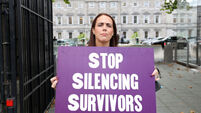‘I’m just sick of people not being believed’: Authorities urged to do more to crack down on spiking

Spiking is in the spotlight once again.
Bars, nightclubs, and music festivals are being urged to do more to stamp out the issue of spiking.
Initiatives launched in Britain in recent months have put the issue back in the limelight, with 5,000 reports made relating to potential spiking each year.













